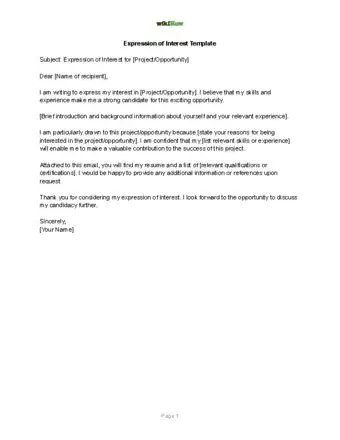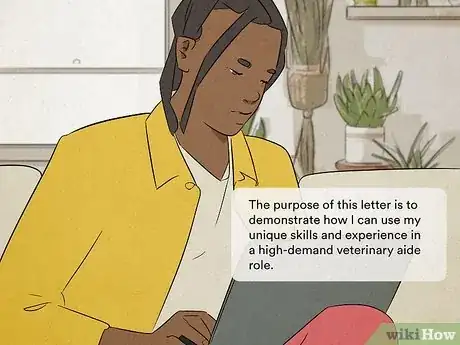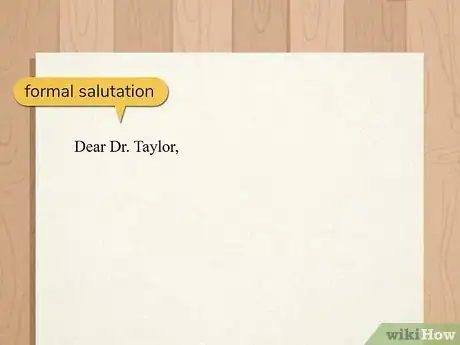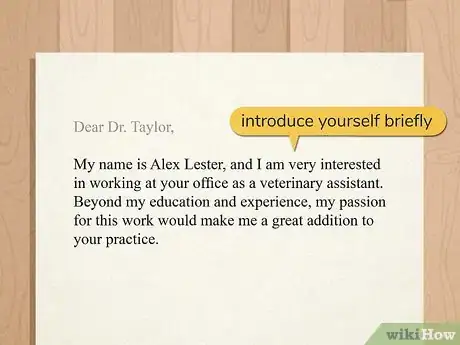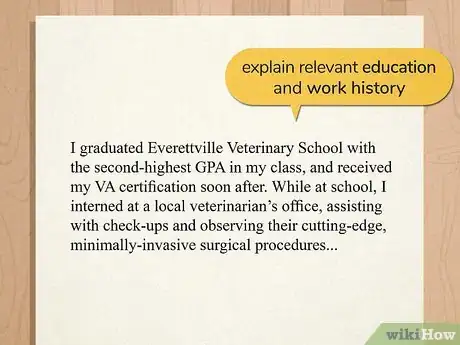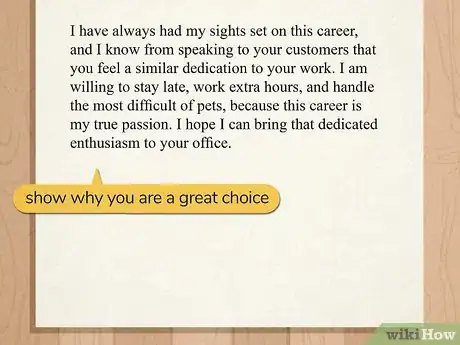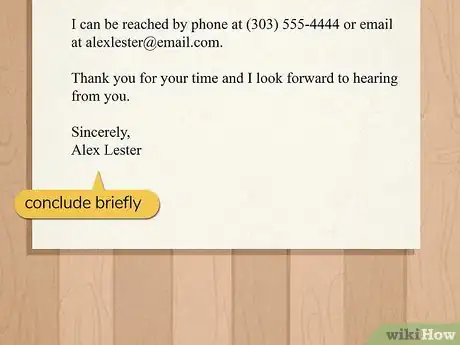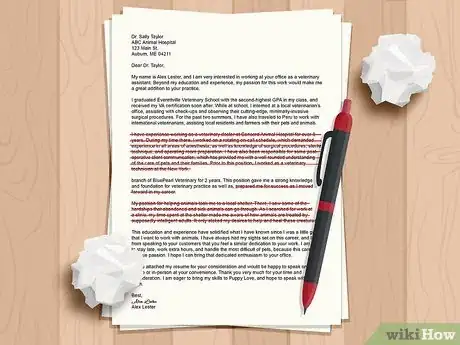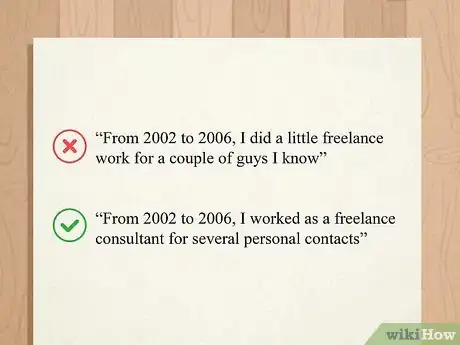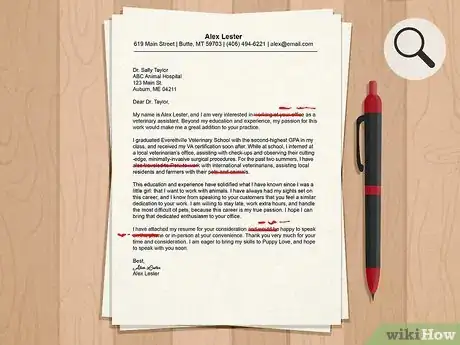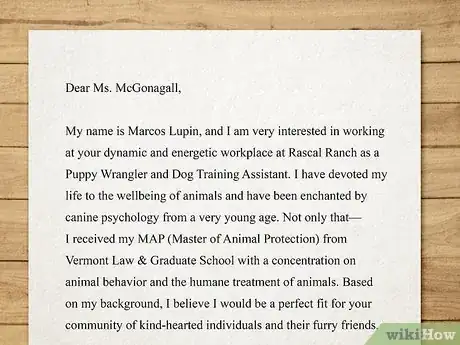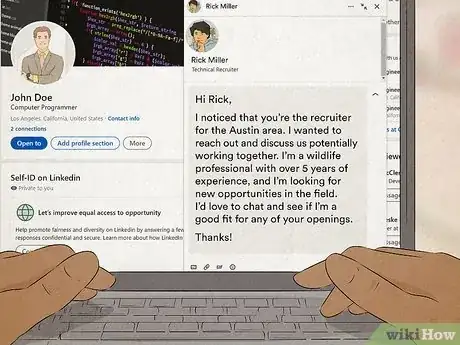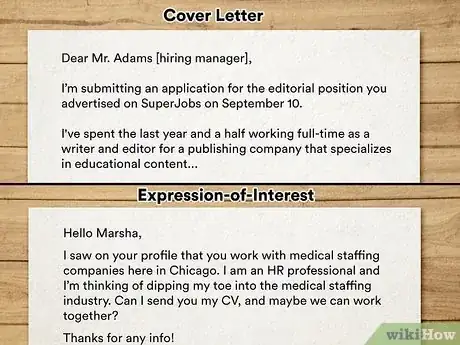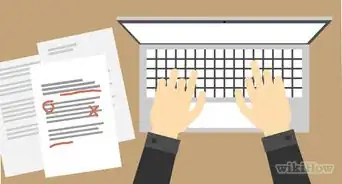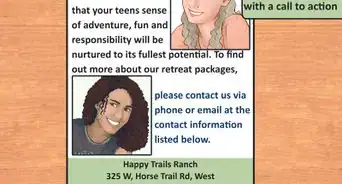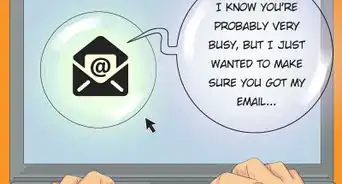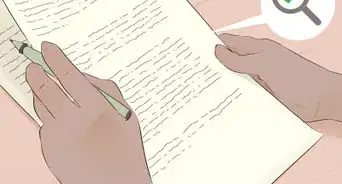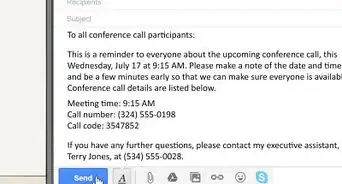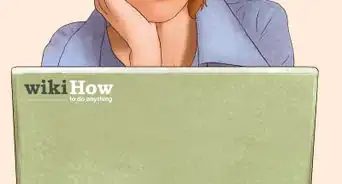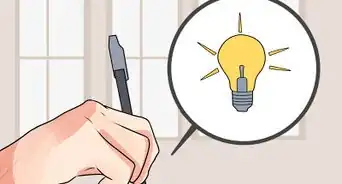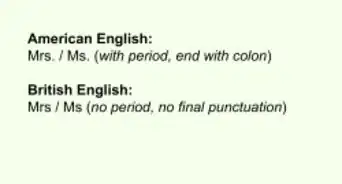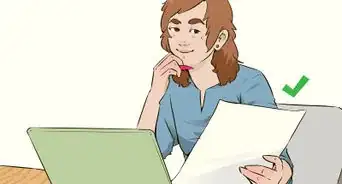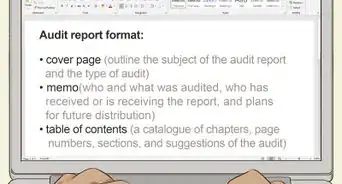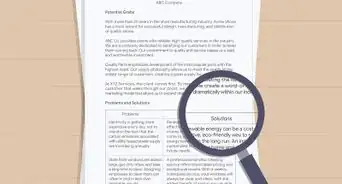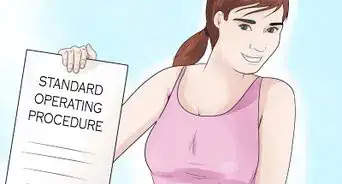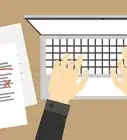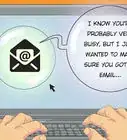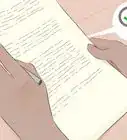This article was co-authored by wikiHow staff writer, Madeleine Flamiano. Madeleine Flamiano is an Editing Fellow at wikiHow based in Berkeley, California, as well as a Team Organizer, Copy Editor, and Movie Critic for Incluvie. Madeleine has 12 years of experience in literacy advocacy and the creative arts that span tutoring, teaching, writing, public relations, and non-profit support. She has penned seven novels under a pseudonym and loves all escapist genres, from cozy fantasies to hard-boiled sci-fi. Her professional path started at NaNoWriMo, where she scripted and hosted a series on worldbuilding. Madeleine graduated from Mills College with a B.A. in English with a concentration in Literature and a Minor in Philosophy.
There are 13 references cited in this article, which can be found at the bottom of the page.
wikiHow marks an article as reader-approved once it receives enough positive feedback. This article received 37 testimonials and 80% of readers who voted found it helpful, earning it our reader-approved status.
This article has been viewed 866,431 times.
Learn more...
In business writing, an expression of interest (or EOI) is a document usually written by prospective job applicants. Like its name suggests, an expression of interest tells a prospective employer that you're highly interested in working for their company. Additionally, a well-written expression of interest shares why you'd be a great asset for their business' team. Here, we'll tell you everything you need to know to craft an amazingly convincing EOI that'll get you one step closer to getting hired.
Things You Should Know
- Open with a formal salutation and briefly introduce yourself. Then, explain your work history and why your experience qualifies you for the job.
- Detail your relevant skills and provide a concise explanation of why you're the best person to work with the company's team.
- Sign off with your full name and contact information so the business can get in touch with you.
Steps
Expression of Interest Template
Writing Your EOI
-
1Determine exactly why you want to work for this company. One of the greatest ways to show you’ve got gusto is to contact a company even if they haven’t published any job openings. Why? Well, if you reach out to a business and sing its praises, you’ll shine during a period of time when they probably aren’t getting any resumes or cover letters.[1]
- Remember, employers love hearing why their job is more attractive to you than other ones because it makes you seem loyal from the get-go.
- For instance, if you're applying for a government IT position, you might want to talk about how a job with the government gives you a chance to use your skills to serve the greater good of the community.
-
2Give your EOI a main "point" or focus. Boil the point of your EOI down to a single sentence (this is pretty similar to how you'd craft a thesis sentence for an essay). Since it can seem a little vague to simply write, "I want this letter to help me get a job," try to jot down a sentence that's more like a mission statement and that captures why you're so driven to create an EOI.[2]
- For instance, you might whittle your EOI's purpose down to something like: "The purpose of this letter is to demonstrate how I can use my unique skills and experience in a high-demand veterinary aide role."
Advertisement -
3Open with a friendly but respectful salutation. Address your letter to the specific person in charge of reviewing applicants — usually the department head or HR manager — with a simple "Dear Mr./Ms. (Surname),". [3]
- If you don't know who this person is, you can either call the company to ask (which shows major initiative) or use a general greeting like "Dear Hiring Professional,".
- Note that most business resources now recommend against using "To Whom it May Concern," since this opener can come across as a little stilted and impersonal.
- Whenever you can use someone's name, definitely include it—this extra step adds more warmth and personality to your letter while keeping it formal.[4]
-
4Briefly introduce yourself. Give your employer a snapshot of who you are so they're well acquainted with you right off the bat. Include what your background is and why you're reaching out to them. This introductory section can usually be contained to 1 paragraph that's no more than a few sentences long.[5]
- For instance, if you're applying for a role as a veterinary assistant, the following might be a perfectly fine introductory section — it tells who you are and why you're writing in under 3 sentences:
- "My name is Alex Lester, and I am very interested in working in your office as a veterinary assistant. Beyond my education and experience, my passion for this work and tending to people's pets make me a great addition for your practice."
-
5Explain your work history and how it qualifies you for the job. Start with your work history, especially if it's impressive. You don't need to be as detailed here as you would on your resume — it's usually enough to mention something like, "I worked at University Vet Hospital for five years as a laboratory animal caretaker." As always, try to keep things brief—a single short paragraph will do.[6]
- It's okay if you're just starting out in your chosen field! For instance, if you're applying for your first-ever job as a line cook in a local restaurant, you might describe your culinary background (including any cooking classes) as well as non-cooking work you've done in restaurants (like serving, hosting, etc.).
-
6Explain why you, specifically, are a great choice as a star employee. Focus on the traits that would make you a valuable worker and end your EOI on a high note by painting a picture of an individual who's rare and special: ultimately, you want a company to feel like it struck gold by learning about you. You may want to bring up:
- Personality. Are you friendly and honest? Have you generally gotten along with your coworkers in the past? Employers like hiring team players — people who will keep a positive attitude at work and keep company morale high.
- Social preferences. Are you a talkative, gregarious extrovert? Are you a quiet, focused introvert? Your habits for interacting with other people can have a serious effect on your job performance — some jobs demand great talkers while others don't.
- Goals and passions. Is this job something you love to do? Can it help you make achieve what you've always dreamed about? Employers like hiring people with intense personal motivations for taking the job.
-
7Conclude graciously but briefly. When you've said everything you need to say to present yourself as a highly qualified candidate and a great fit, you're done! End the letter as succinctly as you can while remaining polite. When your prospective employer reads your short sign-off, it'll be like a breath of fresh air.[7]
- For instance, you might conclude with:
- Feel free to contact me via phone at (303) 555-4444 or email at alex.lester@gmail.com. I look forward to hearing from you! Thank you for your time and consideration.
- Sincerely,
- Alex Lester
- For instance, you might conclude with:
Polishing an Expression of Interest
-
1Re-read your EOI and trim any unneeded content. Whenever you see a sentence that goes on longer than needed to get its point across, shorten it. Similarly, whenever you see a complicated word that could easily be replaced with a shorter one, do so. Your EOI is a functional document that's meant to be read within minutes, so keep it simple.[8]
- If you have time, take a quick break between when you complete your EOI and when you start proofreading. Most writing experts recommend looking at your writing with a fresh pair of eyes so you can spot mistakes more easily.[9]
- Avoid using overly complicated language or jargon in an attempt to impress the recipient. Hiring professionals are not likely to appreciate having to wade through a lengthy EOI just to find your skills and qualifications.
-
2Maintain a formal voice throughout the entire EOI. EOIs should always be written in a professional and dignified tone. Avoid using slang, colloquialisms, or overly casual expressions. A good general rule of thumb is to write as if you're giving an important speech, rather than as if you're talking to a friend of family member.
- For example, if you're talking about your work history, the sentence "From 2002 to 2006, I worked as a freelance consultant for several personal contacts" sounds much more dignified than "From 2002 to 2006, I did a little freelance work for a couple of guys I know", even though both statements have almost the same meaning.
- Take care to keep these formatting issues in mind:
- Headings: In the top left corner of the letter, provide your name, address, phone number, and email address (each on a separate line). Leave a space between your heading and salutation.
- Spacing: Keep the text in your paragraphs single-spaced. Leave a space between each new paragraph.
- Indents: Either indent the first sentence of each paragraph or leave them aligned with the left side of the page. Many sources recommend against indenting if you skip lines between paragraphs.[10]
- Closings: Leave 3 spaces between your closing (e.g., "Sincerely,") and your name.
-
3Proofread for spelling and grammar before submitting. Before you send your EOI, give it one final once-over to look for any minor errors that may have slipped your notice. Keep an eye out for misspellings, inappropriate word use, grammatical errors, and unnecessary content. Below are just a few general tips for proofreading to make sure you're submitting an EOI that's in tip-top shape:[11]
- Work from a printed page, not a computer screen. Seeing your work in a different format lets you view how it appears on the page and can help cure a case of "glazed-over eyes" from looking at a computer screen for hours.
- Read out loud. Hearing your text with your ears in addition to seeing it with your eyes gives you a new and effective way to detect any errors. This is especially good for spotting run-on sentences that might otherwise escape you.
- Get a friend to help. Someone who's never seen the text before may be able to see errors that you can't. Often, spending a long time writing a document can make you overlook errors in it that you've gotten used to seeing.
Community Q&A
-
QuestionHow many words or pages should an expression of interest be?
 Community AnswerLike a cover letter, an expression of interest should never be more than a page long.
Community AnswerLike a cover letter, an expression of interest should never be more than a page long. -
QuestionHow do I improve my interview skills?
 Community AnswerBe honest. Be Open. DON'T be assertive. Let them know you are right for the job.
Community AnswerBe honest. Be Open. DON'T be assertive. Let them know you are right for the job. -
QuestionHow should I write a tender expression of interest?
 Community AnswerFollow you heart and your beliefs. Just keep trying things until you make somethng you like.
Community AnswerFollow you heart and your beliefs. Just keep trying things until you make somethng you like.
Warnings
- Avoid addressing the recipient as "you" (e.g., "You should hire me because...", "I'd be a great fit in your company because..."). This can seem informal and, in some cases, even demanding or even rude.⧼thumbs_response⧽
References
- ↑ https://www.cnbc.com/2019/01/30/10-email-templates-every-successful-job-hunter-needs.html
- ↑ https://opentextbc.ca/writingforsuccess/chapter/chapter-10-persuasion/
- ↑ https://site.uit.no/english/writing-style/letters/
- ↑ http://money.usnews.com/money/careers/articles/2012/10/11/the-7-deadly-sins-of-cover-letter-writing
- ↑ https://www.careerfaqs.com.au/news/news-and-views/how-to-write-an-expression-of-interest
- ↑ https://www.indeed.com/career-advice/interviewing/interview-question-tell-me-about-your-work-experience
- ↑ https://www.indeed.com/career-advice/career-development/business-letter-closing-examples
- ↑ https://www.touro.edu/departments/writing-center/tutorials/seven-steps-to-effective-proofreading/
- ↑ https://owl.english.purdue.edu/owl/resource/561/01/
- ↑ http://www.writingclasses.com/WritersResources/AskTheWriterDetail.php?ID=125
- ↑ http://writing.wisc.edu/Handbook/Proofreading.html
- ↑ https://www.monash.edu/__data/assets/pdf_file/0004/1531858/tips-on-writing-an-expression-of-interest-letter.pdf
- ↑ https://ca.indeed.com/career-advice/resumes-cover-letters/letter-of-interest-vs-cover-letter
About This Article
To write an expression of interest, open with a formal salutation like, "Dear Hiring Professional," then introduce yourself and state the position you're interested in. Briefly explain your work history and how it qualifies you for the job before moving on to listing your applicable skills. Add a line about why you're the best candidate and conclude with "Sincerely" followed by your full name. Remember to keep a formal, professional tone throughout and proofread it carefully before submitting. To learn more, like how to properly format the letter, keep reading the article!
